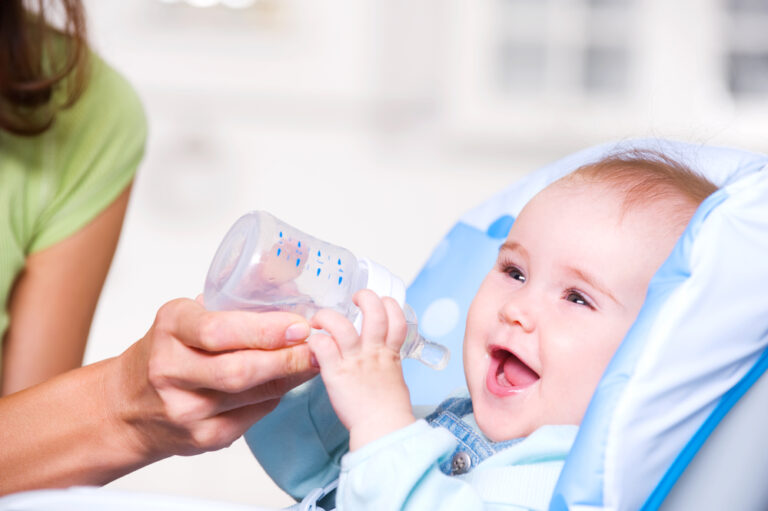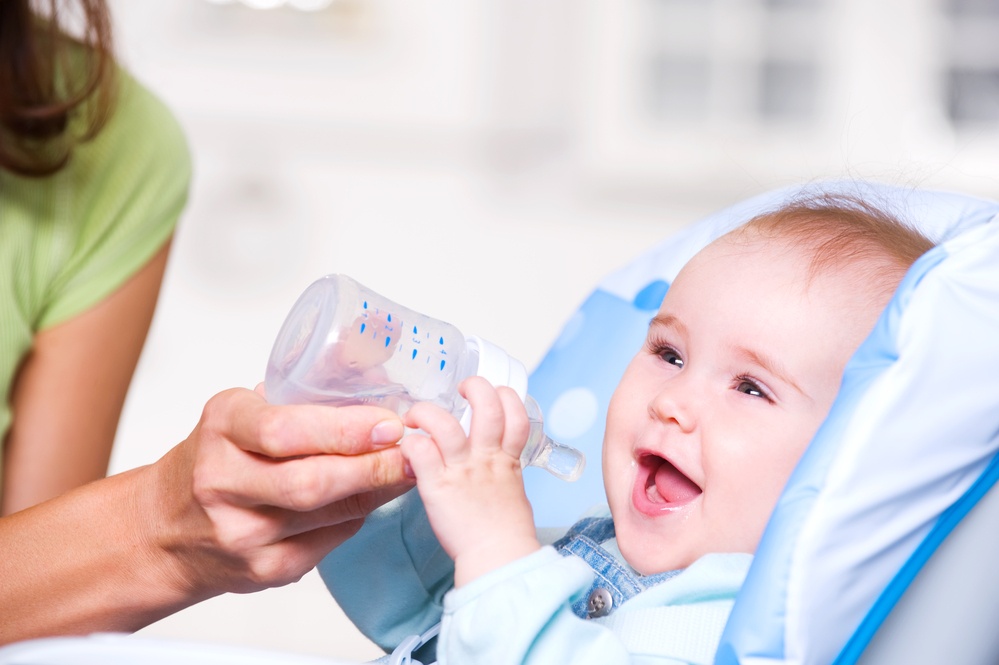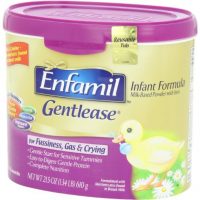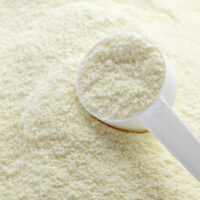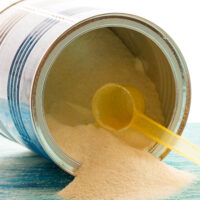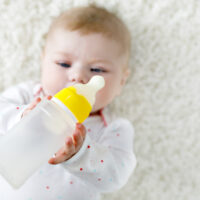Infant and toddler dehydration is a dangerous health condition that can occur at any time of the year.
At birth, 75% of our body is water (source). As we age, that percentage decreases to 50 to 60 percent. Newborns and older infants need to maintain this amount of body water because they more susceptible to water loss than older children and adults. This is because your baby’s kidneys are still developing, so they don’t conserve water as efficiently. Poor feeding or excessive fluid losses from vomiting or diarrhea quickly lead to dehydration in this age group.
Recognizing the causes of dehydration is the first step in preventing and identifying whether or not your baby is suffering from excessive water loss.
Baby Dehydration Triggers
You can be the most proactive parent in the world, but, no matter how hard you try, certain events in your child’s life can lead to dehydration.
Weather
Dehydration that occurs during warm, summer months is common. During this season, families spend more time outdoors in the sun. Body water is lost via sweating in warm temperatures. The greater the temperature, length of time spent outside, and level of physical activity, it is very likely that your child will develop a body water deficit. In addition, if your little one sustains a sunburn, it exacerbates the situation.
You might assume that less body fluid is lost in cold weather. This, however, is not the case. Most chilly weather is accompanied by low air humidity which, in turn, causes your child’s sweat to evaporate more quickly than in hot, humid temperatures. This can trick you into thinking that child will not become dehydrated.
Finally, regardless of the outdoor temperature, being mindful of the climate where you live is very important. Locations such as Phoenix, Arizona or Riverside, California tend to be much drier than Beaumont, Texas or New Orleans, Louisiana. If you reside in a low humidity climate, remember to monitor your baby for signs of dehydration year-round to help prevent this dangerous health condition.
Illness
Everyone contracts a communicable illness at some point in their lives. Regrettably, studies have shown that daycare attendance increases the likelihood of developing such illnesses (source). This should not come as a surprise, especially since infants and toddlers touch everything, then put their hands in their mouths. Put a bunch of these little humans in a room together, and germs spreading quickly. In fact, infants who attend daycare will contract an average of six to twelve viruses within their first twelve months of life (source).
Regardless of whether or not daycare is to blame, when your child develops a fever, vomiting, or diarrhea, it is imperative to offer more that the usual amount of fluids to replenish what is lost (source). Sadly, while in the moment, most parents tend to focus on treating the primary symptoms. While this is important, treating the fluid loss is also crucial.
Why? Because it takes time for dehydration from an illness to develop. Instead, it “rears its ugly head” within a day or two, making it much harder to compensate. If your infant produces less than six diapers within 24 hours, he or she is most likely dehydrated.
Refusing to Eat
Sometimes, babies have difficulty feeding. This is particularly common in breastfed newborns; it often takes a few days for them to learn how to latch and feed from the breast properly. In other situations, nasal congestion interferes with breathing, resulting in difficulty feeding. Either of these scenarios can cause weight loss and dehydration (source). This occurs because, until first foods are introduced, the only real source of fluid is breastmilk or baby formula.
Symptoms of Baby Dehydration
Often times, the symptoms of baby dehydration can mimic other medical conditions. Paying attention to the culmination of factors can help you determine if your infant is suffering from a water deficit (source).
- Dark-colored urine
- Less than six diapers within 24 hours
- Lethargic or sleeping longer than normal
- Sunken soft spot on head
- Sunken or hollow eyes
- Mottled or discolored skin
- Crying with no tears
- Fussiness
For toddlers, the symptoms of dehydration look slightly different:
- Extreme thirstiness
- Dark-colored urine
- Minimal or no urination in eight hours or more
- Constipation
- Lethargic
- Sunken or hollow eyes
- Dry lips
- Chilly extremities
- Crying with no tears
- Elevated heart rate
- Behaving differently than normal
- Muscle cramps
Treating Baby Dehydration
Pay Attention to Symptoms
The first step in treating dehydration is to recognize it. Symptoms may present differently for each child, and can vary based on the severity of dehydration. Furthermore, infants and toddlers cannot fully communicate how they are feeling, so parents must look for concerning signs.
This can be difficult for parents and other caregivers, especially since the same symptoms may be present in other illnesses. If your baby or toddler seems or looks differently, focus on the big picture. Ask yourself, “what did he do today that could cause this?”
If cared for at a daycare facility or by a sitter, call and ask questions. Did she eat today? Did she seem sick? Was she out in the sun for a long time? Symptoms can escalate quickly, so the sooner you treat dehydration, the better.
Contact Your Doctor
If your baby displays signs of dehydration, call your physician immediately. Describe the symptoms, and proceed based on their recommendations.
If symptoms are mild, the doctor will likely recommend re-hydrating with continued feedings, and possibly offering an oral electrolyte solution. Pedialyte is one example of this type of beverage, and it can help prevent an emergency room visit. Always check with your doctor before using it as a remedy. It is a good idea, however, to keep a bottle on hand in case your pediatrician advises it as a treatment option.
If your infant shows signs of severe dehydration, she will likely require hospital care and IV fluids (source). This is especially true under three months of age. This is also the recommendation for neonates with a fever of 100.4 degrees or greater (source).
Continue Regular Feedings
Logically, when most people think of managing dehydration, the go-to solution is to drink more water. This is not the case for infants, especially under six months old. Why? Babies’ kidneys don’t conserve water well. Therefore, giving too much H2O when dehydrated can cause an electrolyte imbalance, and, in extreme cases, water intoxication (source).
Providing infants with their usual amount of breastmilk or formula will provide the balance of fluids and electrolytes that they need. Supplementation with an electrolyte solution should only occur if recommended by your doctor.
Preventing Baby Dehydration
You know the saying: “An ounce of prevention is worth a pound of cure!” Preventing dehydration by keeping baby hydrated is the best solution. By following these three tips, you’ll be able to keep your baby healthy.
Avoid the Main Causes of Baby Dehydration
Avoiding or limiting triggers is a key step in keeping baby hydrated. If your little tyke wants to go for a stroll around the park on a hot day, limit the time outdoors during peak temperature hours (source). This means, between 10 AM – 4 PM, find something fun to do indoors. Consider taking an evening walk instead. If you must be out during this period, make sure your baby has access to shade, air conditioning, and, of course, breastmilk or formula. After age six months, a few ounces of water can be offered as well.
It is impossible to completely avoid illnesses. When they do arise, however, be proactive! Make sure to maintain your infant’s regular feeding schedule as much as possible. More importantly, try to offer the recommended number of ounces of formula or breastmilk each day (source).
Stick to Feeding Guidelines
After birth, if planning to breastfeed, you should attempt feedings every two to three hours. Once your baby is latching and feeding well, you can slowly transition to an “on-demand” schedule (source).
Formula-fed babies should eat on a similar schedule during the first few weeks of life. However, because you are able to see how many ounces your baby consumes, it is important to give the recommended amounts for their age. During the first month of life, your baby should consume 16 to 24 ounces each day. This will increase up to 30 ounces during the second month. By months three to four, babies require 24 to 35 ounces daily, then 28 to 40 ounces by six months old.
Between four to six months old, you may begin introducing solid baby foods. The main source of nutrition, however, should still be formula or breastmilk. On average, infants who eat two to three meals of pureed foods per day will drink 24 to 32 ounces of formula or breastmilk until the first birthday.
At this time, it’s also okay to start offering small amounts of water (no more than four to six ounces per day) as long as your pediatrician okays it (source). This supplementation not only helps keep baby hydrated, but help prevents constipation that may occur once solid foods are part of the diet.
Stay Healthy!
This is always easier said than done. Even so, keeping your kids away from germs is a great way to avoid dehydration. Washing hands after changing dirty diapers, before preparing food, and before holding the baby (if you are a visitor) can make a huge difference (source). Furthermore, when relatives and friends stop by, ask them politely to not kiss the baby, no matter how hard it may be.
For toddlers, it is important to remind them to wash their hands, and to teach good technique. If they are no longer teething, discourage them from putting their hands, and everything else, into their mouths to limit illnesses.
Additionally, do your research when looking for a daycare or preschool. Ask questions about policies for sick kids, and how often the facility is cleaned (source). This can make a big difference when you don’t have the option of working from home.
Frequently Asked Question on Baby Hydration
What happens if my baby stays dehydrated for too long?
Severe dehydration in an infant can lead to a life-threatening condition called hypovolemic shock. In this situation, a baby loses about 20% or more of their body fluid volume. This water deficit causes a decrease in blood pressure, making it harder for blood to travel to and from the heart.
Since babies are so little, it doesn’t take much for shock to develop. Without treatment, this can cause organ failure and even death (source).
Are there liquids that I should avoid giving my child if they are dehydrated?
Yes. Fruit juices, soda, and tea should be avoided at all costs when your child is experiencing dehydration. Many varieties of the latter two contain caffeine which is a diuretic. Caffeinated beverages cause you to urinate more frequently, lose water, and worsen the dehydration (source). Fruit juices and sodas contain an excessive amount of sugar which can exacerbate diarrhea.
Should I just give my baby water every day to prevent this issue?
No. Prior to six months, your baby should only be given breastmilk or formula. Water does not contain the appropriate balance of electrolytes, and infant kidneys are still too immature to handle it.
Once your little one is six months old, you can give them a small amount of water daily. Nonetheless, as mentioned before, breastmilk and formula should remain the primary source of their liquids. After the first birthday when formula is weaned (and breastfeeding in some cases), you may increase your toddler’s water intake.
Final Thoughts
Water is amazing! By consuming the recommended daily amount, skin texture improves, constipation is reduced, body temperature normalizes, and mood and immunity receive a boost. Why wouldn’t you want your infant or toddler to receive the same benefits?
Dehydration in young children can be extremely detrimental to their health. Being proactive by avoiding its causes, and rapidly correcting water losses will help keep your baby healthy. It can also save his or her life. A recent study found that almost 25% of youth do not drink water at all. This is a frightening statistic considering that heatstroke is one of the leading causes of death in teen athletes.
Once your toddler is old enough to drink water regularly, offer it at every meal. Avoid sugary and caffeinated beverages as long as possible (source). Finally, if you know that you will be in a hot or dry environment, have them hydrate before, during, and after exposure. When they are sick, do the same. Your child will benefit from staying hydrated!
